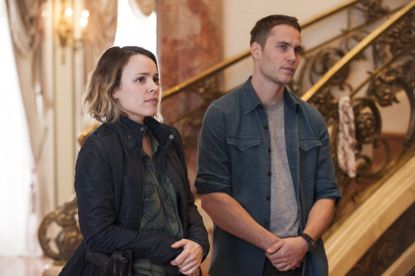True Detective episode 3 recap: You can't keep a bad cop down
In its biggest misstep yet, True Detective sets up a major twist, then gets cold feet


The second season of True Detective began with two hours of dreary, boring sludge — until last week's episode ended with a sudden and welcome bang. As Ray Velcoro (Colin Farrell) examined a house used by murder victim Ben Caspere, he was suddenly confronted by a mysterious figure wearing a crow mask. As Ray tried to draw his pistol, the figure blasted him in the chest with a shotgun, sending Ray crashing to the ground. And then — just to make sure we all got it — the figure walked over and blasted him again, point-blank in the chest.
It seemed as though the many flaws of True Detective's first two episodes were just a canny bit of misdirection. Sure, Ray Velcoro was an obnoxious, uninteresting, two-dimensional cliche of a protagonist — but now we knew he wasn't intended to be the protagonist at all. The murder of Ben Caspere, California's randiest city manager, wasn't the crux of True Detective's second season. The murder of Ray Velcoro was. And Ani Bezzerides (Rachel McAdams) and Paul Woodrugh (Taylor Kistch) — our remaining True Detectives — would be forced to team up with our True Criminal, Frank Semyon (Vince Vaughn), to crack the case.
It all seemed so promising. Until this week's episode of True Detective revealed that Ray Velcoro was alive after all.
Subscribe to The Week
Escape your echo chamber. Get the facts behind the news, plus analysis from multiple perspectives.

Sign up for The Week's Free Newsletters
From our morning news briefing to a weekly Good News Newsletter, get the best of The Week delivered directly to your inbox.
From our morning news briefing to a weekly Good News Newsletter, get the best of The Week delivered directly to your inbox.
Much of True Detective's second season has been miscalculated, but the biggest miscalculation was giving viewers an entire week to imagine this show without Colin Farrell — and to realize how much more interesting this story becomes if you take him out of it. From the first episode of the season, True Detective has felt overstuffed; with three law enforcement officers probing the case, one of them always ends up wandering around alone, divorced from the main action of the episode. And on a macro level, killing Ray — by far the most Rust Cohle-ish of the show's main characters — is exactly the right way to signal a divorce from the acclaimed first season. This is how you take the show in a new direction.
Now, I'll give True Detective a little credit: It finds a way to bring Ray back with some style. "Maybe Tomorrow" opens with a trippy dream sequence that begins as country legend Conway Twitty bursts into a rendition of "The Rose." We're back at the same crappy bar where Ray and Frank hold their meetings — but this time, Ray is meeting with his dad, who offers an apocalyptic monologue before Ray wakes up and rejoins the world of the living.
Between the eerie lighting, the presence of a legendary singer, and the elliptical conversation about trees, the opening dream sequence is so plainly inspired by David Lynch that "homage" doesn't quite cover it. But whatever the dream turns out to mean in the context of True Detective, it clearly rattles Ray. When Ani questions him about what happened, he manages a few wisecracks — but as soon as her back is turned, he looks troubled and haunted, and he spends a fair amount of the episode investigating his personal life, not the murder of Ben Caspere.
That leaves most of the episode's detective work to Ani and Paul, who show up unannounced at the mansion of Vinci Mayor Austin Chessani. This is True Detective, which means that pretty much anybody with a modicum of money or power is hopelessly corrupt. But even by those elevated standards, the Chessani household is a pretty grim place. The mayor's Russian trophy wife is looking exceptionally unpolished, and his son is a scummy hustler, affecting a kind of half-baked Scarface performance for the cops who have turned up on his doorstep.
Sign up for Today's Best Articles in your inbox
A free daily email with the biggest news stories of the day – and the best features from TheWeek.com
Ani and Paul don't uncover much by way of clues, but their visit to the Chessani mansion does set up the larger arc that the season seems likely to follow. Mayor Chessani is enraged that any detective would have the gall to poke him, and he tells Ray he plans to take Ani down. Meanwhile, Ani is meeting with state's attorneys, who know Ray is corrupt, and offer her a promotion if she can help them get his badge. For all its lurid detail, California's power players are bent on turning the Caspere case into a game of cop vs. cop — even if those same cops are discovering a little begrudging admiration for each other.
A second lead takes the detectives to the set of a Mad Max-esque "collapse of civilization revenge flick," on which Caspere arranged tax incentives in exchange for a co-producer credit. The investigation eventually leads to a brief interview with the film's director, Ashley Daison — a character who seems a rather on-the-nose stand-in for True Detective season one director Cary Fukunaga.
This is the second time this season True Detective has introduced a thinly veiled analogue for a real-life person. (The premiere's "Lacey Lindel" — an actress/tabloid magnet with an alcohol-monitoring bracelet — is probably as close as Pizzolatto could get to Lindsay Lohan without getting sued.) But given the widespread reports of tensions between Pizzolatto and Fukunaga during True Detective's first season, it's hard not to look at the hacky, boozy Ashley Daison as anything but a petty slam on Fukunaga. These are the kinds of needless distractions that tend to get fixed in the writers' room. The fact that Pizzolatto is this show's sole writer, and is thus alone in that room, may be at the heart of the second season's problems.
And that brings us back to the issue of Ray Velcoro's death and resurrection. I want to be fair to True Detective, and review it for the show it is, and not the show I want it to be. But when a show has tricked you, for no clear reason, into thinking its protagonist is dead, it's hard to shake that other version of the show from your mind. Take the scene when Ray visits his boozing ex-cop father — a flat variation on a scene that's been done in a thousand cop stories a thousand times before. Even in the context of True Detective's second season, this feels like Nic Pizzolatto repeating himself; for those keeping track at home, the series has now explicitly established that four out of four main characters have daddy issues.
But imagine a version of that same scene in which Ani Bezzerides, not Ray, turns up at the doorstep to deliver the news that Ray is dead. Imagine Ray's gruff, drunk dad, suddenly confronted with the news that his son has died in the line of duty. Imagine Ani, forced to drop her guard just a little as she delivers the awful news about Ray, a man she barely knew, to his father, a man she has never met. That's the kind of scene that could actually make you feel something.
It's also the kind of scene that could inject some genuine stakes into this listless, convoluted case. Last week, True Detective laid itself a more interesting path, then failed to take it — but hey, there's always next week to try again.
Oh, and also...
- At the end of the episode, somebody wearing a creepy white mask torches Ani and Ray's car and runs away. It wasn't a crow's mask, but it's probably connected, right? Is it a faux pas if two people wear the same mask to an orgy cult?
- Meanwhile, in what feels like a totally different show, Frank Semyon can't get an erection for his wife's in vitro appointment, muscles a former colleague into giving him some cash, and rips out the grill of a gangster who dares to insult him.
- For the first time, Ray and Frank meet at the bar without Thematically Convenient Sad Guitarist scoring the scene. What, she had the night off? How am I supposed to know how to feel now?
- If the many, many hints in the first two episodes were too subtle, "Maybe Tomorrow" basically spells it out: Paul Woodrugh is gay. This will no doubt be a disappointment to literally every female character, since Paul's main talent seems to be getting ogled.
- Ray's doctor grills him about his cholesterol, terrible diet, and drug and alcohol abuse. When he asks Ray if he even wants to be alive, Ray doesn't answer. See? Even Ray doesn't think he should be on this show anymore.
- Fun with Los Angeles noir: Philip Moon, who plays Ashley Daison, played Woo in The Big Lebowski — the man who sets the story in motion by micturating on The Dude's rug.
- More fun with Los Angeles noir: Katherine Davis, the woman gunning for Ray's badge, is played by Michael Hyatt, who co-starred as a Los Angeles detective herself in last year's Nightcrawler.
- "There's a certain stridency at work here. I'm gonna put it off to you getting blasted," says Vince Vaughn, understandably stumbling over a combination of words that no human being would ever put together. To paraphrase Harrison Ford, you can type this stuff, but you can't say it.
Create an account with the same email registered to your subscription to unlock access.
Scott Meslow is the entertainment editor for TheWeek.com. He has written about film and television at publications including The Atlantic, POLITICO Magazine, and Vulture.
-
 5 ways to help the environment while on vacation
5 ways to help the environment while on vacationThe Week Recommends An afternoon of planting trees could be the best part of your trip
By Catherine Garcia, The Week US Published
-
 Doctors are taking on dental duties in low-income areas
Doctors are taking on dental duties in low-income areasUnder the radar Physicians are biting into the dentistry industry
By Devika Rao, The Week US Published
-
 Instagram hopes that blurring nudity in messages will make teens safer
Instagram hopes that blurring nudity in messages will make teens saferThe Explainer The option will be turned on by default for users under 18
By Justin Klawans, The Week US Published